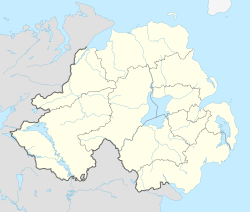
Summary
Thiepval Barracks is a British Army barracks and headquarters in Lisburn, County Antrim.
| Thiepval Barracks | |
|---|---|
| Lisburn | |
 Thiepval Barracks | |
 Thiepval Barracks Location within Northern Ireland | |
| Coordinates | 54°31′27″N 06°3′6″W / 54.52417°N 6.05167°W |
| Type | Barracks |
| Site information | |
| Owner | Ministry of Defence |
| Operator | |
| Site history | |
| Built | 1940 |
| Built for | War Office |
| In use | 1940-Present |
| Garrison information | |
| Occupants | Headquarters, 38th (Irish) Brigade Headquarters, 2nd Battalion, Royal Irish Regiment 2nd Battalion, The Rifles |
It is also the site of the stone frigate HMS Hibernia, of the Royal Navy Reserve in Northern Ireland.
History edit
The barracks were built in 1940.[1] They are named after the village of Thiepval in northern France, an important site in the Battle of the Somme and site of the Thiepval Memorial to the Missing of the Somme.[2]
From 1954, the barracks contained the operational headquarters of No 31 Belfast Group Royal Observer Corps who operated from a protected nuclear bunker on Knox Road within Thiepval Barracks. Converted from a 1940s anti-aircraft operations room (AAOR), the bunker would support over one hundred ROC volunteers and a ten-man United Kingdom Warning and Monitoring Organisation warning team, responsible for the famous four-minute warning in the event of a nuclear strike on the UK. The ROC would also detect radioactive fallout from the nuclear bursts and warn the public of approaching fallout. The two organisations were stood down at the end of the Cold War.[3]
In early 1970, the barracks also became home to 39 Infantry Brigade[4] and provided the headquarters for the Ulster Defence Regiment.[5] The brigade, as 39 Airportable Brigade, was involved in The Troubles in Northern Ireland, eventually taking on responsibility under HQ Northern Ireland for an area including Belfast and the eastern side of the province, but excluding the South Armagh border region. For most of the conflict, signals support for the brigade was provided by 213 Signal Squadron.[6] From September 1970, the brigade was commanded by (then) Brigadier Frank Kitson.[7]
On 7 October 1996 the Provisional Irish Republican Army penetrated the heavily fortified base to detonate two car bombs. The first detonated at 15:35 GMT followed by the second around ten minutes later close to the base's medical facilities where victims were gathering. Warrant Officer James Bradwell (43) was killed and 21 soldiers and 10 civilians were injured. This bombing was the first major attack on a military base in Northern Ireland since the ending of the IRA's ceasefire with the 1996 Docklands bombing.[8][9]
The 39 Infantry Brigade took on some units from 3 Brigade when that brigade was disbanded on 1 September 2004. The HQ 8 Infantry Brigade, based in Shackleton Barracks, Ballykelly, County Londonderry, was disbanded and handed over responsibility to HQ 39 Infantry Brigade at Thiepval Barracks on 1 September 2006.[4]
On 1 August 2007, the brigade was amalgamated with 107 (Ulster) Brigade when the new non-deployable brigade HQ, the 38 (Irish) Brigade, was formed in the province.[10]
Since 2009, Thiepval Barracks has been home to the stone frigate HMS Hibernia, Northern Ireland's only Royal Naval Reserve unit. The unit numbers approximately 100 officers and ratings, and is also home to University Royal Naval Unit (URNU) Belfast.[11][12]
Current units edit
The barracks remain home to:
British Army edit
- Headquarters, 38th (Irish) Brigade[13]
- 2nd Battalion, The Rifles[14]
- Battalion Headquarters & HQ Company, 2nd Battalion Royal Irish Regiment[15]
- 157 Coy (Det), 102 Battalion, REME[15]
- 54 MI Coy, 5 Military Intelligence Battalion, Int Corps[15]
- 32 AEC Gp, Educational and Training Services Branch[16]
edit
Notes edit
- ^ Alan McKibbin (1 March 1956). Army Estimates, 1956–57 (Speech). Belfast East. Retrieved 31 March 2014.
- ^ "Thiepval Memorial". Commonwealth War Graves Commission. Retrieved 14 November 2012.
- ^ "The Royal Observer Corps 1954-1991". Ulster Aviation Society. Archived from the original on 24 October 2013. Retrieved 31 March 2014.
- ^ a b "Shackleton Barracks Ballykelly to Close". sandes.org.uk. 26 June 2006. Archived from the original on 4 October 2011. Retrieved 7 April 2019.
- ^ Potter 2001, p. 24.
- ^ "Northern Ireland – Op Banner | Royal Signals Museum". Retrieved 1 October 2023.
- ^ "Bloody Sunday Inquiry website—Statement of General Sir Frank Kitson" (PDF). Archived from the original (PDF) on 10 February 2010. Retrieved 28 May 2008.
- ^ Paterson, Tony (24 December 2003). "Former British soldier is jailed over IRA attack on base". London, UK: Independent.co.uk.[dead link]
- ^ Vassallo, DJ; Taylor, JC; Aldington, DJ; Finnegan, AP (1997). "Shattered illusions--the Thiepval Barracks bombing, 7 October 1996". Journal of the Royal Army Medical Corps. 143 (1): 5–11. doi:10.1136/jramc-143-01-02. ISSN 0035-8665. PMID 9089545.
- ^ "House of Commons Hansard Ministerial Statements for 10 May 2006 (pt 0032)". publications.parliament.uk. 10 May 2006. Archived from the original on 13 March 2007. Retrieved 7 April 2019.
- ^ a b "URNU Belfast | Royal Navy".
- ^ "Council hosts Beating Retreat in Honour of HMS Hibernia". www.lisburncastlereagh.gov.uk. Retrieved 2 October 2023.
- ^ "38 (Irish) Brigade | The British Army".
- ^ "Regular RIFLES | The British Army".
- ^ a b c "Army Reserve Units | Lisburn".
- ^ "Service Resettlement Advisor Details". www.ctp.org.uk. Retrieved 1 October 2023.
- ^ "HMS Hibernia - Lisburn".


